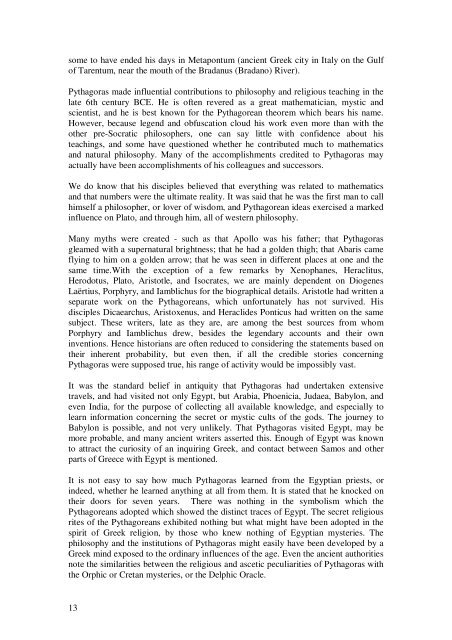Paganism an overview introduction - South African Pagan Council
Paganism an overview introduction - South African Pagan Council
Paganism an overview introduction - South African Pagan Council
You also want an ePaper? Increase the reach of your titles
YUMPU automatically turns print PDFs into web optimized ePapers that Google loves.
some to have ended his days in Metapontum (<strong>an</strong>cient Greek city in Italy on the Gulf<br />
of Tarentum, near the mouth of the Brad<strong>an</strong>us (Brad<strong>an</strong>o) River).<br />
Pythagoras made influential contributions to philosophy <strong>an</strong>d religious teaching in the<br />
late 6th century BCE. He is often revered as a great mathematici<strong>an</strong>, mystic <strong>an</strong>d<br />
scientist, <strong>an</strong>d he is best known for the Pythagore<strong>an</strong> theorem which bears his name.<br />
However, because legend <strong>an</strong>d obfuscation cloud his work even more th<strong>an</strong> with the<br />
other pre-Socratic philosophers, one c<strong>an</strong> say little with confidence about his<br />
teachings, <strong>an</strong>d some have questioned whether he contributed much to mathematics<br />
<strong>an</strong>d natural philosophy. M<strong>an</strong>y of the accomplishments credited to Pythagoras may<br />
actually have been accomplishments of his colleagues <strong>an</strong>d successors.<br />
We do know that his disciples believed that everything was related to mathematics<br />
<strong>an</strong>d that numbers were the ultimate reality. It was said that he was the first m<strong>an</strong> to call<br />
himself a philosopher, or lover of wisdom, <strong>an</strong>d Pythagore<strong>an</strong> ideas exercised a marked<br />
influence on Plato, <strong>an</strong>d through him, all of western philosophy.<br />
M<strong>an</strong>y myths were created - such as that Apollo was his father; that Pythagoras<br />
gleamed with a supernatural brightness; that he had a golden thigh; that Abaris came<br />
flying to him on a golden arrow; that he was seen in different places at one <strong>an</strong>d the<br />
same time.With the exception of a few remarks by Xenoph<strong>an</strong>es, Heraclitus,<br />
Herodotus, Plato, Aristotle, <strong>an</strong>d Isocrates, we are mainly dependent on Diogenes<br />
Laërtius, Porphyry, <strong>an</strong>d Iamblichus for the biographical details. Aristotle had written a<br />
separate work on the Pythagore<strong>an</strong>s, which unfortunately has not survived. His<br />
disciples Dicaearchus, Aristoxenus, <strong>an</strong>d Heraclides Ponticus had written on the same<br />
subject. These writers, late as they are, are among the best sources from whom<br />
Porphyry <strong>an</strong>d Iamblichus drew, besides the legendary accounts <strong>an</strong>d their own<br />
inventions. Hence histori<strong>an</strong>s are often reduced to considering the statements based on<br />
their inherent probability, but even then, if all the credible stories concerning<br />
Pythagoras were supposed true, his r<strong>an</strong>ge of activity would be impossibly vast.<br />
It was the st<strong>an</strong>dard belief in <strong>an</strong>tiquity that Pythagoras had undertaken extensive<br />
travels, <strong>an</strong>d had visited not only Egypt, but Arabia, Phoenicia, Judaea, Babylon, <strong>an</strong>d<br />
even India, for the purpose of collecting all available knowledge, <strong>an</strong>d especially to<br />
learn information concerning the secret or mystic cults of the gods. The journey to<br />
Babylon is possible, <strong>an</strong>d not very unlikely. That Pythagoras visited Egypt, may be<br />
more probable, <strong>an</strong>d m<strong>an</strong>y <strong>an</strong>cient writers asserted this. Enough of Egypt was known<br />
to attract the curiosity of <strong>an</strong> inquiring Greek, <strong>an</strong>d contact between Samos <strong>an</strong>d other<br />
parts of Greece with Egypt is mentioned.<br />
It is not easy to say how much Pythagoras learned from the Egypti<strong>an</strong> priests, or<br />
indeed, whether he learned <strong>an</strong>ything at all from them. It is stated that he knocked on<br />
their doors for seven years. There was nothing in the symbolism which the<br />
Pythagore<strong>an</strong>s adopted which showed the distinct traces of Egypt. The secret religious<br />
rites of the Pythagore<strong>an</strong>s exhibited nothing but what might have been adopted in the<br />
spirit of Greek religion, by those who knew nothing of Egypti<strong>an</strong> mysteries. The<br />
philosophy <strong>an</strong>d the institutions of Pythagoras might easily have been developed by a<br />
Greek mind exposed to the ordinary influences of the age. Even the <strong>an</strong>cient authorities<br />
note the similarities between the religious <strong>an</strong>d ascetic peculiarities of Pythagoras with<br />
the Orphic or Cret<strong>an</strong> mysteries, or the Delphic Oracle.<br />
13


